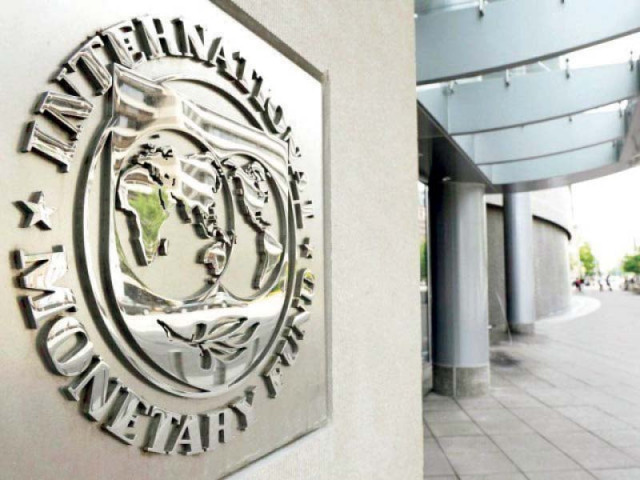IMF seeks lawmakers’ support for implementing unpopular reforms
Fund’s proposals aimed at steep fiscal adjustment that will stifle economic growth, increase inflation

The IMF hinted at further increase in electricity tariffs and a totally free exchange rate regime. PHOTO: FILE
Led by its mission chief Harald Finger, the IMF delegation was scheduled to meet half a dozen parliamentarians belonging to three mainstream political parties to know their viewpoint on the reforms suggested by the lending agency.
But only two of them, Pakistan Tehreek-e-Insaf (PTI) senator Shibli Faraz, who is Leader of the House in Senate, and Pakistan Muslim League-Nawaz (PML-N) Member of National Assembly Dr Ayesha Ghaus Pasha turned up for discussions.
Pakistan Peoples Party (PPP) members did not attend the meeting. “The meeting had been arranged by the government without first seeking our consent,” said PPP Senator and Senate Deputy Chairman Saleem Mandviwalla, who had also been invited.
Pakistan should let market forces decide rupee’s fate: IMF
He said the meeting’s time was set in the early morning on Friday without first checking the availability of members, adding that PPP parliamentarians were keen to meet the IMF delegation.
The IMF requested the parliamentarians to lead the structural reforms which would be implemented under its programme. A meeting participant said the reforms were expected to be highly unpopular. Therefore, the IMF wanted all the political parties to back the programme, which would make it easy to implement them.
The IMF hinted at further increase in electricity tariffs and total free-float of the exchange rate. The government has already increased electricity tariffs by Rs1.27 per unit and the central bank has let the currency depreciate by 26.6% in the past 11 months.
“Pakistan’s poorest segments should be protected against the impact of the structural reforms,” suggested Dr Ayesha Ghaus Pasha while talking to The Express Tribune.
Talks with IMF: Provinces in unison oppose change in NFC
However, the IMF’s recipe is aimed at a steep fiscal adjustment that will stifle economic growth and increase inflation due to proposed massive depreciation of the currency, according to sources in the finance ministry.
They said the implementation of IMF’s policies would lead to a growth rate that would hover around 4% for the next three years.
The IMF team is in the town for the last 10 days to negotiate a bailout package. Talks continued on Saturday as well. Both the sides were having difficulty in agreeing to a new tax collection target for the Federal Board of Revenue (FBR), said the sources.
There is unanimity of views among Pakistani economists that the country needs on an average 7% economic growth to create jobs in order to absorb the youth bulge. Any rate that is below 7% will lead to high unemployment.
“I have told the IMF that Pakistan’s current situation is very peculiar and job creation should not be affected as a result of the Fund programme,” said Pasha. During the meeting, she also emphasised the need for enhancing exports to address the balance of payments challenge on a permanent basis.
Pasha said higher electricity prices would create competitiveness issues for Pakistani exporters, therefore, the IMF should not push for the increase in power tariffs and interest rates.
Senator Faraz raised the issue of adverse impact of the National Finance Commission (NFC) Award on federal fiscal resources. Pasha differed with Faraz’s assertion, saying the federal fiscal woes were more because of mismanagement and the decision to spend in areas that were now within provincial domains.
“I have emphasised the need for making provincial finance commissions effective to ensure equitable regional developments,” said Faraz while talking to The Express Tribune. He said at present the divisible pool was largely distributed on the basis of population that meant “we are awarding the population explosion rather than punishing it”. Currently, the population has 82.5% weight in the divisible pool.
Faraz said the IMF should look into the reasons why Pakistan returned to the Fund so frequently and there was a need to find out whether it was the fault of the IMF’s poor programme design or that of Pakistan.
He said the IMF’s view was that the political ownership was critical for the success of economic reforms in Pakistan. Provincial finance ministers have also separately told the IMF that they would oppose any structural change to the NFC Award.
The IMF wanted to further increase the electricity prices as part of a solution to the circular debt that currently stands at Rs1.3 trillion. But in Pasha’s view, the increase in tariffs would be a problem rather than a solution.
The PTI government will also face difficulties in getting any legislation passed from the Senate, which is controlled by the opposition parties. The passage of at least two bills is expected to be part of the IMF conditions. These relate to amendments to the State Bank of Pakistan Act of 1956 and approval of a new Public Finance Management law.
The PTI government has not yet been able to constitute standing committees due to its refusal to appoint Leader of the Opposition in the National Assembly Shehbaz Sharif as chairman of the Public Accounts Committee.
Published in The Express Tribune, November 18th, 2018.
Like Business on Facebook, follow @TribuneBiz on Twitter to stay informed and join in the conversation.



















COMMENTS
Comments are moderated and generally will be posted if they are on-topic and not abusive.
For more information, please see our Comments FAQ